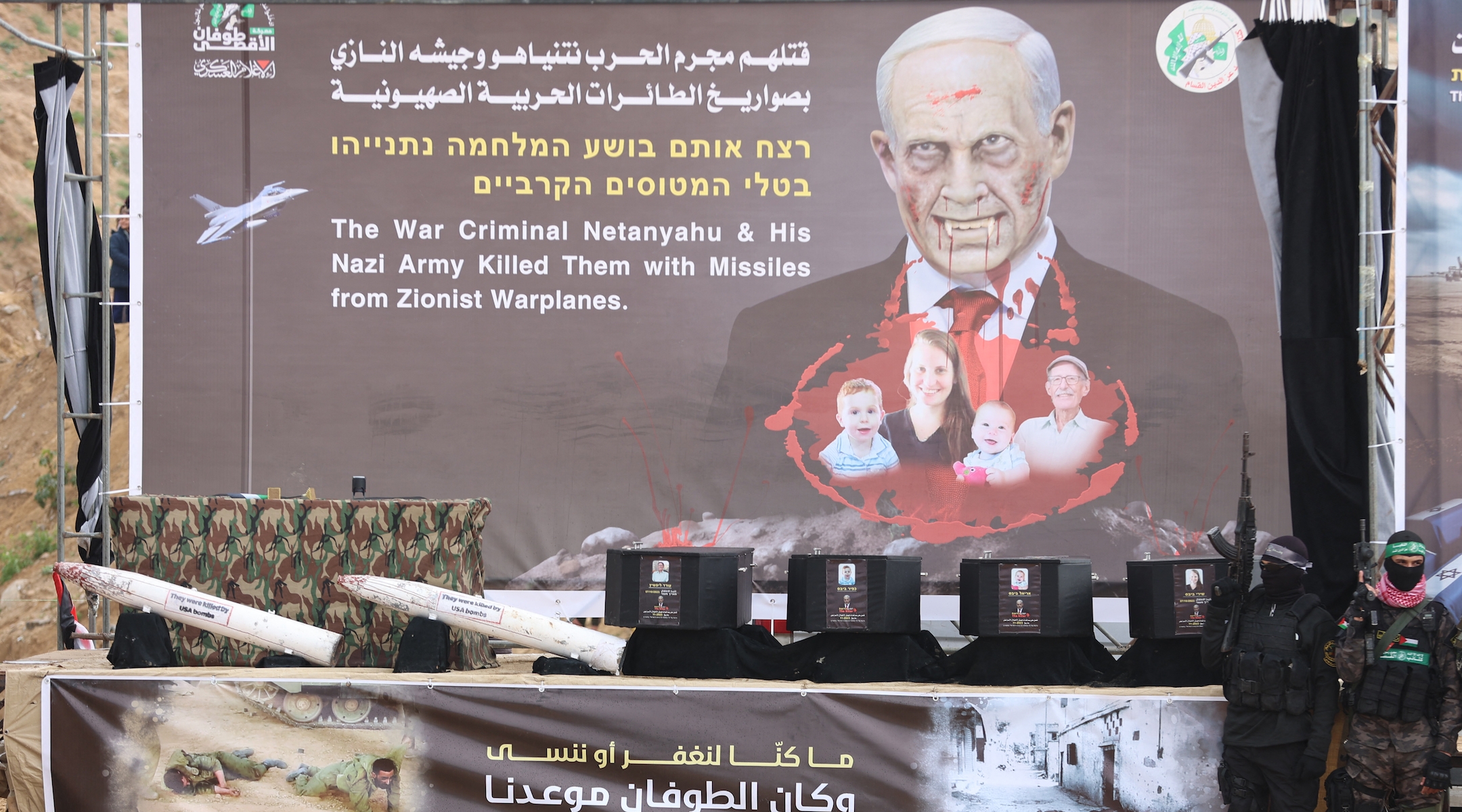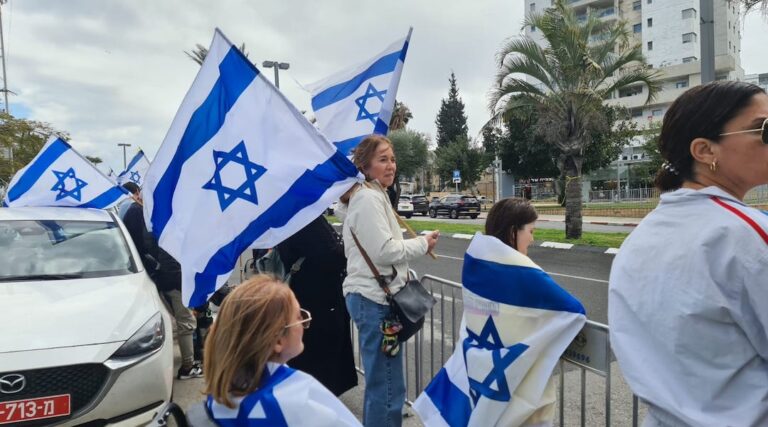Some of the mourners clutched Israeli flags. Others held orange balloons.
On Thursday, hundreds of Israelis stood across the road from the Abu Kabir Forensic Institute in Tel Aviv, the sky shifting between rain and sun, while they paid their final respects to four hostages who, after more than 500 days of captivity, had returned from Gaza in coffins and were due to arrive at the institute.
Two were said to be Ariel and Kfir Bibas, abducted in Hamas’ Oct. 7, 2023, attack at ages 4 and 9 months — the youngest hostages held in Gaza. The body of their mother Shiri was said to return with them. The fourth body belonged to Oded Lifshitz, 84, one of the oldest captives.
The gathering was the most immediate manifestation of a grief that swept across Israel, centered on a mother and two small children who had become the faces of Israel’s hostage crisis and the global efforts to free the captives. Protesters across the world had prayed that their return would occasion relief; instead, Thursday was a day of mourning.
Earlier in the day, the families of the hostages had asked the public to accompany the four fallen captives on their final journey, and Israelis came to answer the call.
“This is the place that I can feel closest to them,” said Yony Alony, who drove up to Tel Aviv with her husband from the southern community of Kidron. “They are my family now. I didn’t do enough to save them.”
Nava Bloch, who also came to Abu Kabir, called Thursday “a day of failure.”
She added, “We’re very hurt today. We did everything we could so that this would not happen and we did not succeed.”
Alony, whose car was adorned with orange ribbons symbolizing the distinctive hair color of Shiri and her sons, said she had held out the slimmest of hopes — remaining convinced until Israel’s formal announcement on Wednesday that the three were still alive and were being used by Hamas as a bargaining chip.
“I was angry that people were talking about their death,” she said. “Even up until yesterday, I had this fantasy that some family in Gaza was taking care of them. There was no way, in my mind, that someone would kill a mother and her babies.”
Yarden Bibas, the boys’ father and Shiri’s husband, was taken captive separately and released alive earlier this month. After the Israeli announcement of Shiri, Ariel and Kfir’s deaths Wednesday, relatives of the Bibas family said they had not given approval to publicly confirm the news. The Israeli military later apologized.
The grief extended far beyond Abu Kabir and Israel. A billboard elsewhere in the country quoted two verses from the biblical book of Lamentations, declaring “My eyes, my eyes are teary… over the ruin of my poor people, as babes and sucklings languish in the squares of the city.”
Across social media, people posted orange hearts to symbolize their mourning.
For many Israelis, the indignity of the day was compounded when Hamas handed over the coffins following a macabre ceremony where the terror group paraded the black-draped coffins, each adorned with photographs of the deceased, in front of a giant poster depicting Binyamin Netanyahu as a vampire and accusing the Israeli prime minister and his “Nazi army” for allegedly killing the four in an airstrike. Israel has not confirmed the circumstances of their death in captivity.
Hamas then transferred the coffins of the dead hostages to the Red Cross. They were locked, and the accompanying keys didn’t work, Israel’s public broadcaster reported.
“Just when you thought they can’t get any more evil, they outdo themselves,” said Sima Yechezkel, from the nearby Neve Ofer neighborhood in Tel Aviv.

Hamas paraded the coffins of four hostages before a crowd ahead of a handoff to the Red Cross on Feb. 20, 2025. (Omar AL-QATTAA / AFP)
For some, the vigil at Abu Kabir was the latest and grimmest public gathering after two years that have seen a near-constant stream of street protests in Israel. Alony described her and her husband’s presence on the streets as their “reserve duty,” and said she has spent the past three years demonstrating against the government — from opposing the judicial overhaul in 2023 to the ongoing rallies calling for an extension to the hostage release and ceasefire deal.
“We have no state. There should have been a revolution long ago. We need a massive change to heal this country,” she said.
Tami Cohen from the central city of Kiriat Ono said she had “lots of feelings of guilt.”
“I couldn’t sit at home,” Cohen said. “We need to try and fix this.”
Cohen indicated that she felt personal responsibility for the four hostages’ deaths.
“This is my country and we abandoned them. The government acted completely irresponsibly, with no sense of duty or compassion,” she said.
Efrat Machikawa, the niece of Margalit Mozes and Gadi Mozes — who were abducted from their homes in Kibbutz Nir Oz and later released, Margalit in November 2023 and Gadi in January 2025 — also made the journey to Tel Aviv while the rest of her family gathered in Kissufim, the first stop along the military convoy’s route.
That meant, she said, that her family was bookending the bodies’ journey from Gaza to Tel Aviv.
“It feels like I’m closing the circle by being at the end of their journey while the rest of my family is at the beginning,” Machikawa said. With tears rolling down her face, she added, “This is the price we pay for abandoning the hostages.”
Lifshitz, 84, was a close friend of her parents and, like Margalit Mozes and Gadi Mozes, was a peace activist and a pioneer of Nir Oz, the community from which the Bibas family was also abducted.
“Our private miracle is only mirroring the sadness and the heartbreaking state of mind of the whole country because Oded, who fought for peace all his life, should have been here,” she said.
Six living hostages are set to be released on Saturday, and four more who have been killed are due for release next week. Nearly 60 hostages be left in Gaza, approximately half of them still alive. They are meant to be released in later stages of the ceasefire deal, which are currently being negotiated.
“All that’s left to do is respect their arrival back home and to continue fighting to bring back everybody, all the hostages and their families and supporters — the good part of Israel that strives for life and not for revenge, that strives for building and not for destroying,” Machikawa said.
After seeing footage of Palestinian children and infants at the ceremony in Gaza, Bloch said she objected to comparisons to Nazism, saying historical parallels were irrelevant.
“I don’t like comparing them to the Nazis. I’m not interested in the past. I’m interested in the now,” she said. “Look what’s happening over there. They’re teaching their kids today to kill Jews — can you get more antisemitic than that?”
Bloch, like others at Abu Kabir, also laid blame on the Israeli government for not reaching a deal earlier to bring back the hostages.
“After everything we did, if we’re here at the pathological institute waiting to identify the bodies of children and a mother who was kidnapped alive, protecting her two babies, and an 84-year-old gentleman who did everything for peace, that’s a very hard thing to swallow,” she said.
Fights over the government’s culpability also permeated the scene at Abu Kabir, leading to a moment of political vitriol. Shortly after the military convoy passed through the gates of the facility, flanked by saluting police officers, a shouting match erupted in the crowd.
“This is all Bibi’s fault!” one man yelled, referring to the Israeli prime minister.
Yechezkel Yechezkel, a man with an identical first and last name who identified himself as a Netanyahu supporter, responded that Benjamin Netanyahu was the only leader who could have orchestrated the hostages’ return, prompting the first man to snap, “You belong in Gaza.”
Some in the crowd urged the brawlers to de-escalate. “Just not today,” one pleaded.
Keep Jewish Stories in Focus.
JTA has documented Jewish history in real-time for over a century. Keep our journalism strong by joining us in supporting independent, award-winning reporting.

